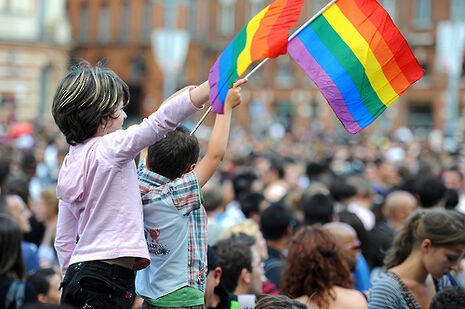Cambridge research finds children in gay adoptions at no disadvantage
The University’s Centre for Family Research confirms in new research that parents’ homosexuality does not impact on childrens’ development

A new report published by the Centre for Family Research in the University of Cambridge has found that children adopted by gay couples are at no disadvantage compared to children adopted by heterosexual couple. The research dispels myths that the masculine or feminine tendencies of children are impacted by the sexuality of their parents, confirming the assertions of gay rights campaigners.
The report arrives in LGBT ‘Adopt and Foster’ week, during which over 30 events are expected to be hosted across the country, encouraging people from the gay and transgender communities to consider adoption as an option. It is estimated that in the next year an additional 9000 foster carers will need to be found in response to the growing number of children in care, an estimated further 4000 children are expected to need adopting.
New Family Social is a charity run for LGBT adoptive and fostering parents. Andy Leary-May, a representative, suggested that if just 2% of the LGBT community made the decision to foster or adopt then the shortage of adoptive parents could possibly be met.
These discussions come shortly after the same-sex marriage bill was passed in the House of Commons with a majority of 225 votes. The issue of same sex adoption re-occurred in the rhetoric of campaigners upon both sides repeatedly. The Welsh Secretary, David Jones, justified his vote against the same-sex marriage bill on ITV Wales’ Face To Face programme upon the grounds that he did not believe same sex couples capable of creating a “warm and safe environment” in which to raise children. He later released a statement claiming that he was not opposed to same sex couples raising children, nor taking part in civil partnerships, his views were in regards to marriage.
David Jones’ comments appear mild in comparisons to the criticisms of Winston McKenzie, the UKIP spokesman for culture, who was reported in the metro as having compared a gay couple raising a child to “child abuse”. McKenzie espoused the highly controversial view that “a caring loving home is [with] a heterosexual or single family”. The report from the Centre for Family Research however challenges this assertion, alongside his claim that a non-heterosexual family environment was “unhealthy” for a child.
The report is the first examination of the effects of the Adoption and Children Act, which was first implemented in December 2005. Its findings are overwhelmingly a positive confirmation for campaign groups such as New Family Social. The study of 130 gay, lesbian and heterosexual adoptive families with children between four and eight years old revealed that in actual fact the three types of families were characterised “more by similarities than differences” and that the “children seemed to have very comparable experiences regardless of their parent’s sexual orientation”.
This news should come as welcome to the parents of the 100 children who were adopted by same sex couples during the year ending on the 31st March 2011.
LGBT ‘Adopt and Foster’ week is accompanied by significant political developments in Westminster. Between Tuesday 5thand Thursday 7thMarch, the Committee of the Children and Families Bill with hear oral evidence from a variety of groups. The government claim that the bill presents the "best hope for children to thrive". One of the key aspects of this bill is a proposal to delete the clause that requires adoption agencies to consider a child’s racial origin and culture in their placement. This may have curious implications for the role of diversity and minority identity in the lives of adopted children.
The report from the Centre for Family Research overwhelmingly asserted “difference is a feature of adoptive family life” and its importance as “part of the narrative of adoptive family practice.”
Although the general message of the report was overwhelmingly positive it did state the limitations of its research, in that the experiences of the children would likely change with attendance of secondary school. Whilst only “seven out of a possible 81 families reported that their children were teased about their same sex parents”, this situation might change as the children began to attend secondary school. The report stated that “only follow-up will reveal how things turn out in the future.”
 News / Caius mourns its tree-mendous loss23 December 2025
News / Caius mourns its tree-mendous loss23 December 2025 News / Clare Hall spent over £500k opposing busway 24 December 2025
News / Clare Hall spent over £500k opposing busway 24 December 2025 Comment / Yes, I’m brown – but I have more important things to say22 December 2025
Comment / Yes, I’m brown – but I have more important things to say22 December 2025 Comment / The ‘class’ of Cambridge24 December 2025
Comment / The ‘class’ of Cambridge24 December 2025 Interviews / Politics, your own way: Tilly Middlehurst on speaking out21 December 2025
Interviews / Politics, your own way: Tilly Middlehurst on speaking out21 December 2025







